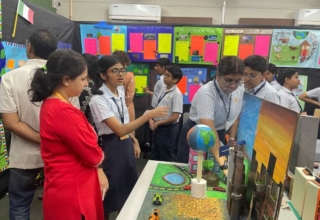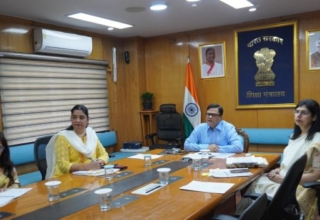
Mountain and hill regions have been lately in focus due to a spate of landslide and flash flood disasters in recent times and there is already a fear that more destruction is in store as the carrying capacity of these regions has gone beyond a saturation point.
In this backdrop, an international seminar by Delhi-based The Mountain Climate Trust on the topic of ‘Empowering Mountain Communities’ and a book discussion on renowned environmental professor and founder of ATREE, Dr Kamaljit S. Bawa‘s internationally acclaimed coffee table book ‘Himalayas: Mountains of life’ on Nov 4 in New Delhi provided a platform for a host of experts to discuss the emerging challenge of addressing sustainability of mountain ecosystems. It was felt that an overarching regional authority could coordinate efforts to build resilience.
According to Ms Saifullah, Founder and Managing Trustee of MCT the objective of the seminar was to be a voice and a platform to all Institutions and NGOs working to mitigate Climate change in the Mountains.
Parliamentarian and noted environmentalist Sant Balbir Singh Seenchewal, along with Virendra Dayal, Former Chef de Cabinet United Nations, Member Human Rights Commission and Lt. Gen Ata Hasnain (Retd), Former GOC 15 Corps (Srinagar), Member NDMA and Chancellor Central University of Kashmir attended the proceedings.
In his keynote, Seenchewal known as the Green Sant painted a painful picture of the ecological health of mountains said: “My heart goes out to the mountains as they are the first to bear the brunt of climate change. Our sages in the past climbed up the hills to meditate, they survived alone on fruits and were scarcely equipped to lead their lives. Life in the hills isn’t easy which is why people there are simple and make do with whatever little they can. But in recent times, things have changed. Everyone wants to travel to the hills for holidays, trek etc and the more affluent ones want to build their homes there to live comfortably in the summer months leading to unnecessary construction. And trust me, as compared to the facilities we are now developing in the hill states of India, we are not even sparsely equipped to manage the solid waste! None of us are unaware of the monsoons hills faced the past season. Cloud bursts and landslides are only becoming frequent.”
He also talked about Kali Bein, the river was a dirty drain due to negligence of the population of the surrounding area, which due to hi intervention is now source of clean water supply for irrigation purposes. “President APJ Abdul Kalam termed this project as ‘One of the Nine Wonders of India’”, he added.
Lt Gen Syed Ata Hasnain, talked the about the scenario from the point of view of national security, “Mountains are where National Security has huge stakes, with the LoC and the LAC both existing there. The onset of Climate Change threatens mountain infrastructure and displaces several mountain communities from traditional areas posing several security and disaster risks which need deep study to overcome.”
The seminar was also attended by Dan Singh Rawat, Chairman, Uttarakhand Development Bank Ltd., Eklabya Sharma, former Director General, ICIMOD (International Centre for Integrated Mountain Development) and the world’s leading authority on the subject, Dr. Kamaljit S. Bawa FRS. Distinguished Professor Emeritus, University of Massachusetts, Boston and Founder, Ashoka Trust for Research in Ecology and the Environment, Bengalurut, Falguni Rajkumar, IAS Retd, Former Secretary, Government of India, Special Advisor UNIDO, Chairman IIM, Shillong, Dr Siddiq Wahid, PhD, Harvard University and distinguished Professor, Centre of Excellence for Himalayan Studies. Representatives of Ministry of Environment and Forests, Wildlife Institute of India Dehradun and Govind Ballabh Pant National Institute of Environment, Katarmal, Almora, Amity University Noida also attended.
Representatives of NGOs from all the Himalayan States, Indian Forest Service /Institute on Himalayan forests and wildlife and Institute of Excellence on Himalayan Studies, Shiv Nadar University also registered their voice in the seminary. Captain Swadesh Kumar, Founder-President, Adventure Tour Operators Association who spoke on the importance of porters and sherpas in the mountain tourism industry. Kartikeya Desai, Founder of Desai and Associates shared how the role of development economics can help promoting sustainability and impact in mountain communities. Samay Chedda, Partner, Nova Char spoke about the use of biochar charcoal and wood vinegar for soil rejuvenation. Asheesh Sharma, Senior Executive, Greenbird spoke on the need for sustainable waste management in mountain communities. He shared his expertise on how to develop and implement sustainable waste management systems that are tailored to the specific needs of mountain communities.










